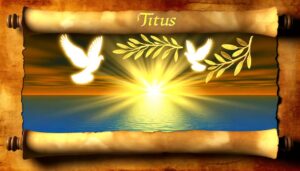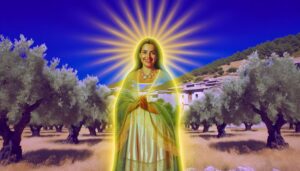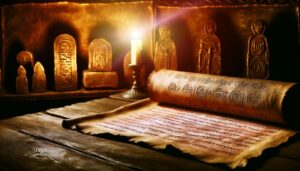Biblical Meaning of Name Noah
The name Noah, deriving from the Hebrew 'Noach,' signifies rest and comfort, carrying profound theological implications. Biblically, Noah is depicted as a righteous and blameless figure chosen by God to build the Ark, ensuring the survival of humanity and animal species during the flood.
The Ark symbolizes divine protection, obedience to God's command, and unwavering faith. Post-flood, God establishes a covenant with Noah, marked by the rainbow, emphasizing themes of divine grace and mercy.
Noah's legacy extends into fundamental Judeo-Christian teachings on covenant and righteousness. Exploring more deeply reveals the multifaceted dimensions of faith embodied in his story.

Key Takeaways
- Noah means 'rest' or 'comfort' in Hebrew, derived from the root 'נח' (Noach).
- Represents divine purpose, solace, and redemption in scriptural narrative.
- Symbolizes unwavering trust and obedience to God's commands.
- Associated with themes of divine protection, mercy, and covenant.
- Embodies righteousness and the foundation of a renewed humanity post-flood.
Origin and Etymology
The name Noah, derived from the Hebrew root 'נח' (Noach), meaning 'rest' or 'comfort,' holds significant etymological and theological implications in biblical literature. This etymology suggests a divine purpose in the character's role within the scriptural narrative, emphasizing themes of solace and divine intervention.
The root 'נח' appears in various forms throughout Hebrew texts, often associated with restfulness and peace, underscoring Noah's connection to divine tranquility. In theological contexts, Noah's name not only conveys a sense of physical rest but also a deeper spiritual reprieve, symbolizing God's covenantal promise of relief from the chaos of human sinfulness.
Consequently, the etymology of Noah's name intricately ties his identity to the broader themes of redemption and divine mercy.
Noah in Genesis
Within the book of Genesis, Noah emerges as a pivotal figure whose life narrative encapsulates themes of divine judgment, covenant, and redemption. The Genesis account portrays Noah as a righteous man chosen by God to survive a cataclysmic flood intended to purge the earth of corruption. This narrative highlights the profound relationship between divine justice and mercy.
| Aspect | Details |
|---|---|
| Righteousness | Noah is depicted as blameless among his peers. |
| Divine Selection | Chosen by God to construct the Ark. |
| Covenant | God establishes His agreement with Noah post-flood. |
| Preservation | Noah's family and animal species are safeguarded. |
| Legacy | Noah is the ancestor of a renewed humanity. |
Noah's story therefore serves as a foundational episode in understanding God's interaction with humanity.
Symbolism of the Ark
Symbolizing divine protection and salvation, the Ark serves as a tangible manifestation of God's covenant with Noah and His promise to preserve life amidst judgment. The Ark's construction, meticulously detailed in Genesis, illustrates God's instructions and human obedience, exemplifying a harmonious relationship between divine command and earthly execution.
As a vessel of refuge during the cataclysmic flood, the Ark stands as a testament to God's mercy and the sanctity of life. Its dimensions and materials, divinely ordained, underscore the precision and care inherent in God's salvific plan. Additionally, the Ark's preservation of diverse species signifies the continuity of God's creation, emphasizing renewal and hope.
Consequently, the Ark encapsulates profound theological themes of protection, faithfulness, and divine grace.
Lessons of Faith
Noah's unwavering trust in God's command to build the Ark, despite the absence of immediate evidence of the impending flood, exemplifies profound lessons of faith and obedience.
This narrative underscores the essence of faith as defined in Hebrews 11:1, 'the assurance of things hoped for, the conviction of things not seen.' Noah's actions reflect a deep-seated trust in divine wisdom, highlighting the principle that faith often requires acting on God's instructions, even when they defy human logic or understanding.
Additionally, Noah's obedience illustrates that true faith is accompanied by corresponding actions, as emphasized in James 2:17, 'faith by itself, if it does not have works, is dead.'
Therefore, Noah's story serves as a powerful paradigm of living faith.
Noah's Legacy
The legacy of Noah extends beyond his immediate survival of the flood, embodying enduring themes of covenant, righteousness, and divine grace that have profound theological implications.
Noah's covenant with God, symbolized by the rainbow, represents a divine promise of mercy and the renunciation of future global destruction by flood.
His righteousness, contrasted against the prevailing corruption of his time, underscores the importance of moral integrity and obedience to divine will.
Noah's story illustrates the concept of divine grace, as he was chosen not for inherent perfection, but for his faithfulness and willingness to follow God's commands.
Therefore, Noah's legacy serves as a foundational narrative that continues to resonate within Judeo-Christian teachings and ethical considerations.
Conclusion
The name Noah, rooted in ancient etymology and biblical narrative, serves as a vessel of profound theological significance. Through the Genesis story, Noah symbolizes divine obedience, faith, and salvation, encapsulated within the ark's protective embrace.
His legacy, enduring through millennia, offers enduring lessons in unwavering faith and righteousness. Like a lighthouse guiding ships through tumultuous seas, Noah's life illuminates a path of spiritual resilience and divine trust, underscoring the timeless relevance of his story.






